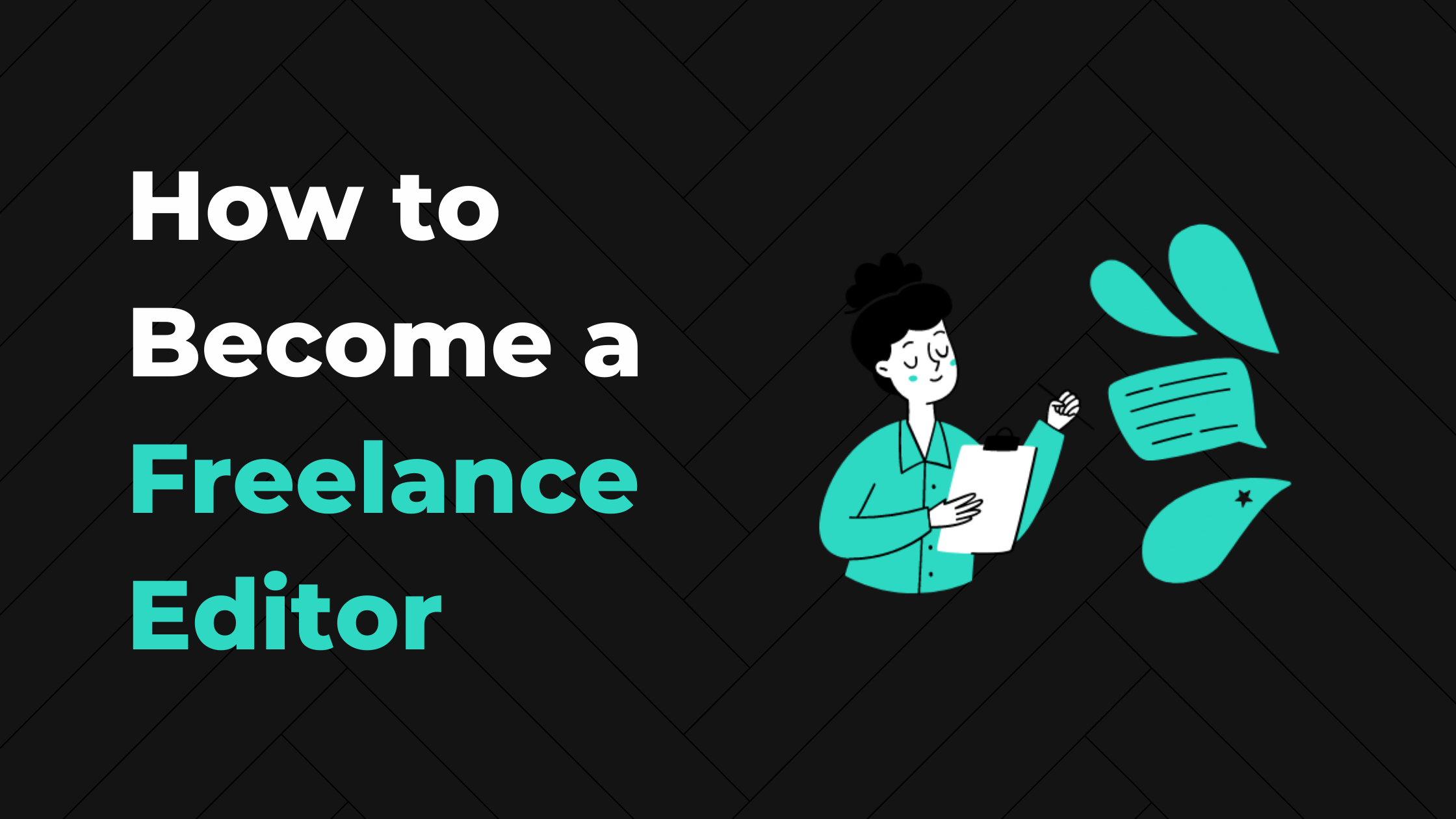How To Become A Freelance Editor In 2024
Master words, master freedom! Unleash your editing skills in 2024. Our guide shows you how to become a freelance editor and land dream writing gigs. Click to learn!
Author:Liam EvansReviewer:Habiba AshtonJan 08, 20248.9K Shares175K Views

If you possess excellent writing abilities, you may find it worthwhile to explore the path of becoming a freelance editor as well. Given that editing is a complementary skill to writing, offering both services to clients can be a logical step, particularly if you aim to increase your income. Although editing differs from writing, grasping certain fundamental concepts is essential for entering the editing sphere. This article will cover all the essential basics to help you learn How To Become A Freelance Editor.
A Freelance Editor
A professional editor is an individual who examines written content, enhancing and rectifying it through various means. While specific job duties may vary depending on the role and the nature of the text, an editor typically:
Engages with the text multiple times, applies their knowledge of language, writing, and grammar to address editorial issues, modifies word choices and language to enhance the text's overall flow, provides feedback to the writer on various aspects, and functions as a partial ghostwriter when substantial restructuring of the text is required. A freelance editor is an independent contractor who is self-employed, undertaking editing assignments on a per-case basis for diverse individuals, companies, or clients as the need arises.
Why Writers Should Delve Into Freelance Editing
Consideration of freelance editing is paramount for writers, as this additional skill bestows invaluable insights and advantages. If you are currently engaged in freelance writing, delving into the realm of editing can bring forth numerous benefits.
The act of editing refines a writer's artistry by fostering a discerning eye for detail, structure, and style. It heightens an appreciation for the nuances of language, thereby improving the capacity to articulate ideas effectively.
Moreover, editing imparts a diverse skill set, rendering writers versatile in a competitive market. In an era marked by trends like AI and other technological tools, possessing a broader skill repertoire can position you as a more appealing choice for prospective clients to consider hiring.
The Role Of Freelance Editors
In the writing industry, the contribution of editors is indispensable, given the necessity to enhance and polish written pieces before they are published.
The principal duty of editors is to meticulously assess and revise written content, ensuring it achieves clarity, conciseness, coherence, freedom from errors, and alignment with the intended purpose and target audience.
Below is a more comprehensive breakdown of the tasks undertaken by freelance editors:
Addressing Grammar And Language Concerns
Freelance editors rectify grammatical errors, spelling inaccuracies, and punctuation irregularities, and guarantee consistency in language usage, such as distinguishing between American English and British English. Additionally, they verify proper sentence structure and assess overall readability.
Enhancing Style, Tone, And Clarity
Editors assist writers in maintaining a uniform style and tone throughout the text, adapting it as necessary for the specific project—whether it requires a more formal, informal, persuasive, technical, or creative approach. To ensure clarity and coherence, freelance editors may rearrange paragraphs, sentences, or sections to enhance flow and comprehension. They also remove jargon or complex language that impedes understanding.
Constructive Feedback and Improvement Suggestions Freelance editors contribute constructive feedback and suggestions to elevate the overall quality of writing. This may involve providing comments or recommendations for revising specific sections.
Structural Organization And Consistency Oversight
Editors scrutinize the comprehensive structure of a document, encompassing headings, subheadings, and the logical progression of ideas. They may propose adjustments or resequencing of content to enhance organizational coherence.
Maintaining uniformity in formatting, style, and terminology is a priority for editors throughout the document. This involves adhering to consistent use of fonts, headings, citation styles, and relevant terminology.
Fact-Checking And Proofreading
Editors engage in fact-checking, scrutinizing figures, references, and information for accuracy, particularly in non-fiction and academic writing contexts.
Conducting a meticulous final proofread is part of the editorial process to capture any lingering typos, formatting discrepancies, or minor issues before the document is deemed ready for publication.
Compliance With Specifications
When a document is targeted for a particular publication or is subject to specific guidelines (such as adherence to a particular style guide like APA or the Chicago Manual of Style), editors guarantee meticulous adherence to these guidelines.
Supervision Of Writers And Content
Editors, depending on the nature of the project, may take on managerial responsibilities, overseeing tasks related to project management. This could involve establishing deadlines, managing various editing phases, and collaborating with other team members, including proofreaders or designers.
Diverse Editing Roles
Freelance editors have the flexibility to engage in a range of editing domains, encompassing book editing, academic editing, content editing for websites and blogs, technical editing, and beyond. Some may choose to specialize in particular genres or subject areas, providing focused expertise in specific niches.
Irrespective of the editing context, their overarching objective is to elevate the quality and influence of written content, all while honoring the author's voice and original intent.
How To Become A Freelance Editor
Shifting from a Writer to a Freelance Editor can be a gratifying career transition or a valuable augmentation to your skill set.
Explore a comprehensive, step-by-step guide on transitioning to a freelance editor, leveraging your foundation in writing.
Evaluate Your Abilities And Engage In Practice
Assess your writing proficiency, grammar, and precision in detail, as these constitute a crucial foundation for editing.
Following this evaluation, it's advisable to hone your editing skills through practical exercises, especially if you feel a bit inexperienced in this aspect. Initiate the process by editing your own work and volunteering to edit content for friends, colleagues, or local organizations—building a portfolio of edited pieces is imperative.
Explore Additional Methods To Enhance Your Editing Expertise
Explore educational resources and courses that cover fundamental editing principles, style guides (e.g., Chicago Manual of Style, AP Style), and industry norms. If possible, consider pursuing formal education in editing.
Review the initial sections of this article to grasp the essential skills crucial for the success of freelance editors. You may identify specific areas that stand out to you, providing clear areas for improvement.
Identify Your Specific Area Of Focus
Define the kind of editing you wish to specialize in, whether it's copyediting, proofreading, developmental editing, or niche-specific editing such as academic or technical editing.
Assemble A Portfolio
Gather a collection of samples showcasing your editing work. Emphasize a diverse range of genres, styles, and subjects to underscore your adaptability as an editor.
Establish An Online Presence
Create a professional website or blog to exhibit your editing services. Incorporate your portfolio, contact details, pricing information, and testimonials from clients or collaborators.
Leverage social media platforms, particularly LinkedIn, to connect with potential clients. Participate in writing and editing communities where job opportunities are frequently posted. Promote your services on online job boards and across your social media channels.
Initiate Networking
Participate in writing and editing conferences, and workshops, and become a member of professional organizations such as the Editorial Freelancers Association(EFA).
Consider active engagement on social media, interacting with individuals who might offer potential editing opportunities.
Establish Your Pricing
Establish competitive rates that reflect your expertise, taking into account your skill level, the specialized nature of your services, and the complexity of the editing tasks you undertake. This requires a thoughtful consideration of your proficiency, the unique value you bring to the editing process, and the time and effort required for each project.
Conduct thorough research on industry benchmarks to ensure your pricing aligns with prevailing standards. Understanding the market rates not only aids in positioning yourself competitively but also demonstrates a commitment to fair and industry-standard compensation. Striking the right balance between acknowledging your worth and remaining competitive within the market contributes to building a sustainable freelance editing business. By aligning your rates with the industry landscape, you enhance your credibility and increase the likelihood of attracting clients who value and recognize the quality of your editing services.
Organize Administrative Tools
Craft thorough and detailed contracts that explicitly outline project particulars, including the scope of work, specific deadlines, agreed-upon payment terms, and revision policies.
By providing clarity on these aspects, you establish a solid foundation for a transparent and mutually beneficial working relationship. Emphasizing project specifics helps mitigate misunderstandings and ensures that both parties are aligned on expectations.
In addition, consider integrating invoicing software into your workflow to enhance efficiency in payment management. Utilizing such tools not only streamlines the invoicing process but also helps maintain a systematic record of financial transactions.
This approach contributes to a professional and organized business operation, reinforcing reliability and trust with your clients. Efficient payment management not only ensures timely compensation for your services but also contributes to a positive client experience, fostering long-term professional relationships.
Satisfy Your Clients
Provide exemplary service to your clients by consistently meeting deadlines, fostering clear and open communication, and embracing constructive feedback. Ensuring punctuality in your deliverables demonstrates reliability and professionalism, while transparent communication establishes a foundation of trust. Being receptive to feedback not only showcases your commitment to client satisfaction but also offers opportunities for continuous improvement. Satisfied clients are not only inclined to engage your services repeatedly but are also more likely to enthusiastically endorse and refer your editing expertise to others in their network.
Sustain Continuous Learning And Business Growth
Stay abreast of industry developments, emerging editing tools, and evolving writing trends. Consider enrolling in advanced editing courses or pursuing certifications to further refine your skills.
Keep in mind that building a freelance editing career requires patience and persistence. Utilizing your writing background can prove advantageous, showcasing your grasp of the writer's perspective and boosting your credibility as an editor. Over time, you can establish a reputable presence and expand your freelance editing enterprise.
Remote Opportunities In Freelance Editing
One of the key advantages of freelance editing is the ability to perform the work remotely.
While full-time or in-house editors may need to operate from an office, freelance editors relish the flexibility of working from any location.
Although these jobs don't have a centralized hub, you can discover them through:
- Upwork
- Your personal network
- Pitching to diverse publications or companies
- Job boards
How Much Can A Freelance Editor Earn
Estimates of the average income for freelance editors serve as general benchmarks, with actual earnings influenced by factors such as reputation, negotiation skills, overall demand, and the specific industry or niche of specialization.
For instance, there's typically a surplus of editors available for work in fields like film, music, or gaming, making it relatively straightforward for publishers and clients to find suitable candidates. On the other hand, locating an editor with the requisite qualifications and knowledge for tasks like editing legal textbooks or medical research is more challenging and may command higher rates for qualified individuals.
As a broad reference, the estimated average base pay for freelance editors in the UK ranges from £29,439 according to Glassdoor, £35,989 according to Indeed, to £48,750 according to Talent.com. These figures are broadly comparable to incomes expected in staff positions, contingent upon the publisher and market within which you operate.
Client projects are frequently advertised on general freelancing platforms and specialized media outlets such as Journalism.co.uk, JournoResources, or HoldtheFrontPage. Additionally, curated email newsletters like Freelance Writing Jobs by Sian Meades-Williams provide a compilation of opportunities directly to your inbox. Twitter, a preferred platform for many freelancers, writers, and editors, serves as a valuable space for networking, gaining advice, and potentially securing client referrals.
Frequently Asked Questions - How To Become A Freelance Editor
Can I Work As A Freelance Editor While Having A Full-time Job?
Yes, many freelance editors start their careers part-time while maintaining other employment. Transitioning to full-time freelancing can be gradual as your client base and workload grow.
Should I Specialize In A Particular Genre Or Industry As A Freelance Editor?
Specializing can enhance your expertise and marketability. Consider your interests and strengths when choosing a niche, but remain open to diverse projects to broaden your experience.
Can I Take On International Clients As A Freelance Editor?
Yes, freelancers often work with clients globally. Be mindful of time zone differences and communicate clearly about deadlines and expectations.
Conclusion
Become a better writer with this guide on "how to become a freelance editor". The path to freelance editing isn't paved with overnight success, but it's paved with opportunity. Hone your skills, find your niche, build your portfolio, and confidently claim your place in the world of words. Remember, the most powerful tool in your arsenal isn't a comma splice rule, but your passion for language. So, go forth, fellow word warrior, and edit your way to freedom. The blank page awaits, and its potential is boundless, just like yours.
Jump to

Liam Evans
Author

Habiba Ashton
Reviewer
Latest Articles
Popular Articles



